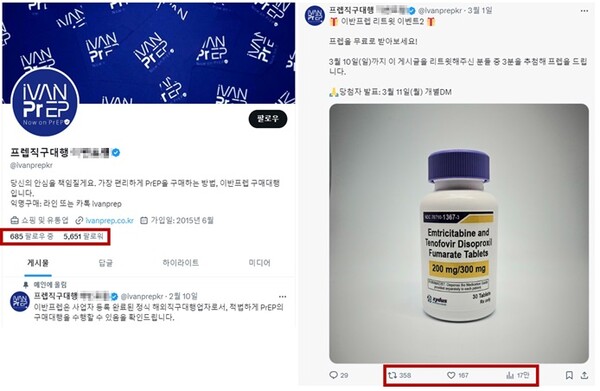As the Korea Disease Control and Prevention Agency (KDCA) prepares to announce the “Second Round Measures to Prevent and Control Acquired Immune Deficiency Syndrome (2024-2028)” soon, poor access to HIV pre-exposure prophylaxis (PrEP) has emerged as an issue.
Many Koreans are believed to be purchasing PrEP therapies directly from overseas, revealing the lack of access to these products, industry sources said.

On Feb. 21, the KDCA held a public hearing to collect opinions on the direction of HIV infection management. At the event, the KDCA also reviewed the achievements of the first round of HIV prevention and control measures implemented over the past five years and unveiled its second-round plan for the next five years.
Looking back on the first round of prevention and control measures implemented over the past five years, the participants found that overall performance was disappointing compared to the original goals. While indicators related to the cure rate and viral suppression rate of HIV-infected people have improved, the implementation rate of other key performance indicators and tasks has been unsatisfactory.
In response, the KDCA said it would re-implement the first plan by complementing the tasks not accomplished and strengthen the second plan by adding new tasks. For instance, the second plan includes a detailed task on “expanding PrEP” as one of the key tasks to achieve under the first strategy of “preventing new infections.”
To this end, the agency plans to reduce the cost burden of PrEP drugs, improve access to prescription, and strengthen prevention activities for vulnerable populations by activating publicity.
In reality, however, experts question the government's willingness and the practicability of its plans.
For instance, the KDCA has set a target of 500 PrEP users per year, starting in 2024, and increasing the number by 50 per year to 700 by 2028. However, skeptics said the targets are far too low. With 1,000 new HIV infections per year, it's hard to see how this will substantively prevent it, they said.
Worse, there is no rational basis for supporting this target. Effective prevention requires estimating the number of "high-risk" people, but Korea lacks such data.
Furthermore, the number of PrEP prescriptions in the country is very low. For example, the number of post-marketing surveillance (PMS) cases of Truvada, the only available PrEP drug in Korea, has stood at only 22 over the past six years, although the Korea Medical Assistance Foundation covers 50 percent of the drug cost.
The problem is that the 22 cases in six years do not correctly reflect the actual demand for PrEP in Korea, given there are people who buy PrEP drugs through direct overseas purchases.
It is estimated that the number of users who purchase generic PrEP drugs through direct online sales far exceeds the number of official prescriptions in Korea. In reality, various online websites promise that getting PrEP delivery is easy by simply entering buyers’ credit card information.
Even though PrEP is a specialty drug under the Pharmaceutical Affairs Act and is illegal to sell or buy online, these direct sales sites are thriving.
A domestic generic PrEP procurement agency has created a social media page to recruit customers. The social media account has as many as 5,674 followers.
The company frequently organizes giveaways where users retweet promotional posts to win free generic PrEP drugs. The most recent giveaway post had 170,000 views and 358 retweets.
Buying medications through direct overseas purchases can cause side effects resulting from taking medications without a doctor's prescription, the high risk of counterfeit medications, and failure to know how to take them correctly.
There are original PrEP drugs available for prescription in Korea, and the government even subsidizes drug costs. Why would anyone take the risk of purchasing PrEP through an off-label overseas source, then?
Experts presumed it is attributable to a combination of factors, including the complexity of the domestic PrEP prescription process and concerns about privacy due to social stigma. These issues are likely to be the primary drivers of the direct purchase of PrEP from abroad, consequently posing a serious obstacle to HIV prevention efforts in the country.
These experts, therefore, call for expanding PrEP coverage to the entire MSM, streamlining the prescription process, and, most importantly, improving social awareness of PrEP.

